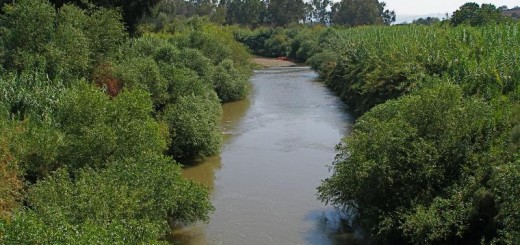Blessings and woes: there’s a choice to be made here
 At the beginning of this month, we saw how Jesus began his ministry in the book of Matthew with a list of blessings, beneficial outcomes to getting it right and doing life God’s way. These blessings have come to be known as the Beatitudes and we explored them in ‘So what does living like the Jesus way look like in practice?’.
At the beginning of this month, we saw how Jesus began his ministry in the book of Matthew with a list of blessings, beneficial outcomes to getting it right and doing life God’s way. These blessings have come to be known as the Beatitudes and we explored them in ‘So what does living like the Jesus way look like in practice?’.
It’s good to follow God’s way. There are good things that will come to us if we follow God’s path. It stands to follow that the opposite is also true – that if following God’s way has good consequences, then not doing it God’s way will also have consequences. Throughout the four Gospel accounts, these negative consequences are described as woes: things that cause great distress or sorrow. In Luke’s account, he sets the blessings in direct contrast to the woes.
Looking at his disciples, he said:
“Blessed are you who are poor,
for yours is the kingdom of God.
Blessed are you who hunger now,
for you will be satisfied.
Blessed are you who weep now,
for you will laugh.
Blessed are you when people hate you,
when they exclude you and insult you
and reject your name as evil,
because of the Son of Man.Rejoice in that day and leap for joy, because great is your reward in heaven. For that is how their ancestors treated the prophets.
But woe to you who are rich,
for you have already received your comfort.
Woe to you who are well fed now,
for you will go hungry.
Woe to you who laugh now,
for you will mourn and weep.
Woe to you when everyone speaks well of you,
for that is how their ancestors treated the false prophets. Luke 6:20-26
 This passage highlights the stark difference between short term gain and long term gain. Those who go for an easy life now will pay later. Those who have it all now will lose it all in the life to come. Those who look after themselves with no thought of others will have consequences to face in the future. It’s a short-sighted view of life: investing everything in the here and now.
This passage highlights the stark difference between short term gain and long term gain. Those who go for an easy life now will pay later. Those who have it all now will lose it all in the life to come. Those who look after themselves with no thought of others will have consequences to face in the future. It’s a short-sighted view of life: investing everything in the here and now.
Things will not always be as they appear now. That’s the point Jesus is making here. Those who put themselves out for others will be rewarded. Those who choose the uncomfortable path of standing up for what is right now are investing in their spiritual relationship.
Further on in Luke’s account of Jesus’ life, the writer expands further on what kinds of behaviour in the present will lead to long term negative consequences. He’s addressing the Pharisees and the experts in the Law – the ones the people look to as role models of how to live in right relationship with God. They’re quick to judge others for getting things wrong – external behaviours on the whole – but Jesus can see all the ways in which they’re getting it wrong themselves.
When Jesus had finished speaking, a Pharisee invited him to eat with him; so he went in and reclined at the table. But the Pharisee was surprised when he noticed that Jesus did not first wash before the meal.
Then the Lord said to him, “Now then, you Pharisees clean the outside of the cup and dish, but inside you are full of greed and wickedness. You foolish people! Did not the one who made the outside make the inside also? But now as for what is inside you—be generous to the poor, and everything will be clean for you.
Woe to you Pharisees, because you give God a tenth of your mint, rue and all other kinds of garden herbs, but you neglect justice and the love of God. You should have practised the latter without leaving the former undone.
Woe to you Pharisees, because you love the most important seats in the synagogues and respectful greetings in the marketplaces.
Woe to you, because you are like unmarked graves, which people walk over without knowing it.
One of the experts in the law answered him, “Teacher, when you say these things, you insult us also.”
Jesus replied, “And you experts in the law, woe to you, because you load people down with burdens they can hardly carry, and you yourselves will not lift one finger to help them.
Woe to you, because you build tombs for the prophets, and it was your ancestors who killed them. So you testify that you approve of what your ancestors did; they killed the prophets, and you build their tombs. Because of this, God in his wisdom said, ‘I will send them prophets and apostles, some of whom they will kill and others they will persecute.’ Therefore this generation will be held responsible for the blood of all the prophets that has been shed since the beginning of the world, from the blood of Abel to the blood of Zechariah, who was killed between the altar and the sanctuary. Yes, I tell you, this generation will be held responsible for it all.
Woe to you experts in the law, because you have taken away the key to knowledge. You yourselves have not entered, and you have hindered those who were entering.” Luke 11:37-52
This is tough stuff, isn’t it? A huge indictment on those who mistakenly think they’ve got it all right, who believe their way is God’s way, the only way, and are determined to impose that way on others. That could potentially be me of course, and potentially you too – that’s the great challenge here, isn’t it?
 The Pharisees are more concerned with how things appear on the outside than what is actually going on on the inside. And the way to start to put that right is very simple – be generous to the poor – except that doesn’t feel so very simple, does it, and we can be guilty of finding ways to complicate it because basically, we just don’t want to share.
The Pharisees are more concerned with how things appear on the outside than what is actually going on on the inside. And the way to start to put that right is very simple – be generous to the poor – except that doesn’t feel so very simple, does it, and we can be guilty of finding ways to complicate it because basically, we just don’t want to share.
The Pharisees have come to believe that if they give to God what is considered the minimum requirement, then that leaves them free to do what they want with the rest. They’ve lost sight of the truth that everything we have is God’s and that whatever we have is all God’s to do with as He sees fit.
The Pharisees enjoy being noticed. They like the pedestal and the limelight. They love people admiring them and speaking well of them. They want their good deeds to be noticed and talked about.
Most of us like all that, to be honest. We may think we don’t, but we find the opposite hard to cope with. We don’t like the good things we do to go unnoticed. We naturally want credit for the good that we’ve done. We all crave to be recognised, appreciated – we want that pat on the back.
The experts in the law are guilty of giving the people a load of expectations to live up to, unwritten rules of how to behave without any support as to how to actually achieve that. They set the bar high – unrealistically high – without any sense of how real people actually live real everyday lives. They’ve hindered people from approaching God, made it impossible for people to enter into relationship with God. They’ve made people dependent on their rules and rituals, as if their way is the only way.
Does any of that sound familiar?
There’s a huge challenge here, isn’t there? (I feel I’ve said that a lot this month!) Getting into a way of thinking that is not based on short term personal gain, when in fact that is the way modern day society functions all around us all of the time, is a big ask.
I wouldn’t even know where to begin!
Well, if that’s the case, begin where Jesus suggests beginning – But now as for what is inside you—be generous to the poor, and everything will be clean for you.
Begin there. Begin with your attitude to the poor. Begin with generosity.
Who knows where that will lead….












